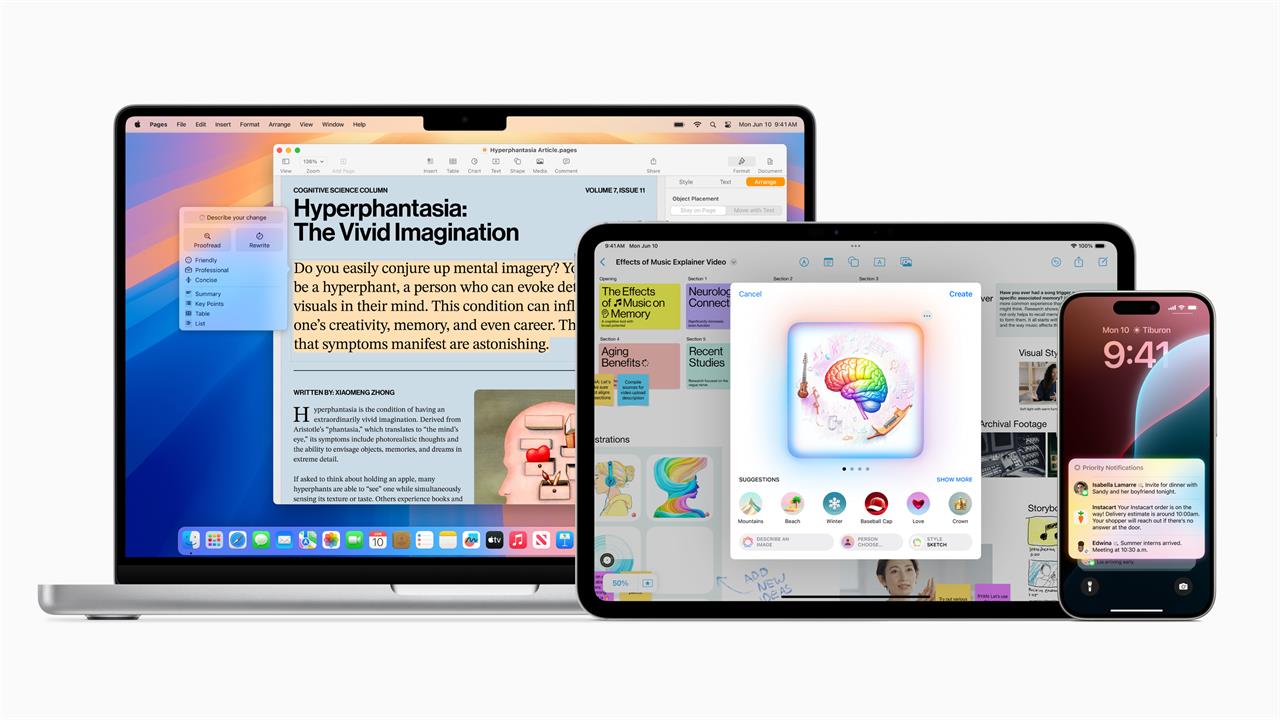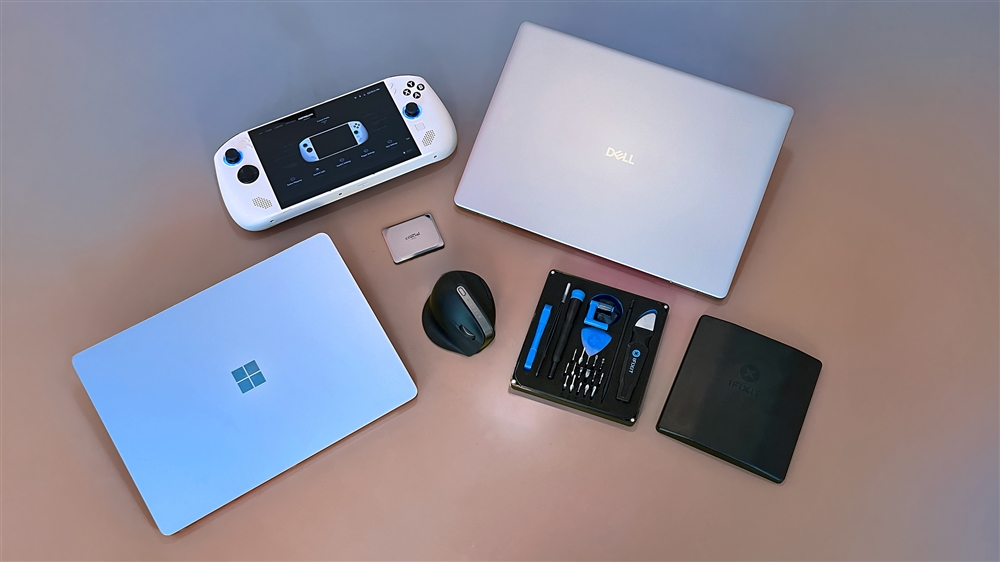Apple Intelligence: How It Stacks Up Against Copilot, Gemini, and More
Apple officially joins the AI race with its own take on artificial intelligence, plus Siri updates, and a deal with ChatGPT.News

Artificial intelligence is showing up everywhere in the tech industry, and that includes upcoming free software updates for Apple's iPhones, iPads and Mac computers in the fall. Apple's approach to AI, which it calls Apple Intelligence, is different from Google and Microsoft in important ways that the company says will be easier to use and respectful of user's privacy.
"We are embarking on a new journey to bring you intelligence that understands you," Apple Senior Vice President of Software Engineering, Craig Federighi said while announcing the products. "It draws on your personal context to give you intelligence that's most helpful and relevant for you. It protects your privacy at every step, and it is deeply integrated into our platforms and throughout the apps you rely on to communicate, work and express yourself."
We're likely to learn more about Apple Intelligence (which cleverly also abbreviates to "AI") when the company starts making it publicly available for testing in the fall, but here's what we know so far, and how it stacks up against the competition.
Free, but only recent devices
While Apple Intelligence will be free to use, it will only operate locally on iPads, Mac desktops and laptops running Apple Silicon M1 chips or later. For iPhones, Apple said its AI will only work with the $999 iPhone 15 Pro and $1,199 iPhone 15 Pro Max, which were released last year, and presumably the next generation of phones coming in the fall of 2024.
By comparison, Google has made its cloud-based Gemini broadly available to pretty much anyone using a web browser, as has Facebook with the Meta AI, and Microsoft with Copilot. Separately, Copilot Plus PCs are a new class of computer that require new neural processing chips capable of 40 TOPS or more to access local AI skills.
Focus on privacy
Apple said the "cornerstone" of its AI systems will be on-device processing, but when a device needs more computing power, the company said it's built specialized "Private Cloud Compute" data centers running the company's AI technologies. And, Apple said, its servers will be designed with software that can be inspected by independent experts to ensure the company's living up to its privacy promises.
Google and Microsoft have also promised privacy protections for their AIs through privacy controls, but there are caveats. For example, Google has warned that it's collecting information about conversations, your location and usage information.
Microsoft meanwhile has promised it will ask users before activating one of its key AI tools for Copilot Plus PCs by default. Recall, which is designed to take regular screenshots of your computer to help "retrace your steps" on your computer, was initially questioned by privacy experts who expressed concern that people who have physical access to a given device could potentially access sensitive data. Subsequently, Microsoft has made pre-launch changes to Recall to address those issues, including making the feature opt-in and encrypting its data.
Actions to integrate apps
Apple said its AI tools are designed to help you reference information in your life.
An example Apple showed involved asking Siri about a family member's flight information, which had been shared in email. But Siri was able to find it, then pull current flight information to let you know if it's on time. Siri was also able to tell if you'd had a text chat with that person to set up a meal, and pull that information as well, without having to open the Mail or Messages apps.
Apple said its AI will allow all sorts of apps to work across the operating system, also allowing people to use Siri either by voice or by typed-in text to control their iPhone.
Microsoft said it intends to introduce similar features, helping people identify documents, images and videos across their computer, while also automating a lot of tasks. Google meanwhile has made its Magic Editor free to most Google Photos users, and has announced similar AI automation plans for its Gemini for Google Workspaces service, but those features require a subscription payment.
Summaries
Apple is adding summary technologies throughout its iPhones, iPads and Mac computers. It'll summarize a text message chain if you're just coming to it, or a long email. Apple said it can also understand the context of a conversation, so that if you say you want reduced notifications, it will still send ones it thinks are important.
One example of how these summaries will show up is through the Safari web browser. When you visit a website for a hotel, for example, the highlights feature will show its location in a tooltip, alongside a button for opening the Maps app. It'll do the same for TV shows and music.
The company said its Reader function, which simplifies webpages, will now organize information in a table of contents, created by on-device AI.
Microsoft and Google for their part have spent the past couple of years integrating similar functions into their respective work and productivity apps, though most functions are specialized to each app.
Writing
The new writing tools can understand and rewrite text you've written to help change your tone and grammar. Apple's examples included making text more friendly, more professional or more succinct.
Apple said you can also choose specific text you want the writing tools to change. In its example, that meant rewriting an invitation part of an email into a poem.
These features are pretty standard across AI tools, and integrated into both Microsoft and Google's technologies, as well as Meta's AI, ChatGPT and other competing products.
Search and media editing
Apple's built image editing tools will be similar to Google's Magic Editor, allowing you to remove bits from a photo, like an unexpected person in the background. But the company said it went a step further, allowing you to search within photos and videos, asking the system for moments like casting a fishing line, and then collecting them into a collage.
Apple said its AI technologies will be added to the notes, voice memos and phone apps, allowing people to record phone calls or meetings with automatic transcriptions and summaries created by the system.
Math and handwriting
Apple said it's developed on-device AI that can understand handwritten notes and math problems on the iPad.
You can write out a math equation, and the iPad will apparently be able to understand variables you've set. As you change various numbers in the equation, the data will update in real time on the screen. Apple said you can even create logarithmic graphs merely by indicating what "x" and "y" should be.
With handwriting changes, Apple said its new technologies can make our chicken scratch look much better, and in real time. Or even take rough drawings and turn them into more polished art, much like the Copilot Plus Cocreator feature does.
Working with ChatGPT
While Apple's AIs are designed to sort through the information and apps on our devices, the company acknowledged there will be times when people need technology with broader "world knowledge" or "specialized domain expertise." For those experiences, Apple said it intends to partner with other AI companies, integrating them into its iPhones, iPads and Mac computers in a way that won't make users "jump between different tools."
One example it showed was if a user asks Siri for a recipe idea from various ingredients, it'll suggest kicking the question to ChatGPT, which Apple said will be free to use without an account. The response back from ChatGPT will also have a prominent warning at the bottom, "Check important info for mistakes."
"Your requests and information will not be logged," the company added. "You're in control over when ChatGPT is used, and will be asked before any information is shared."
Read more: AI Tools and Tips
- What is TOPS? The AI Performance Metric Explained
- Copilot Plus PCs vs AI PCs: What's The Difference?
- Microsoft Launches a New Era of Copilot Plus PCs
- Hands-on with the Faster, Smarter ChatGPT-4o AI
- Why Coders are Learning to Love Copilot
- Roll Your Own GPT: Setting Up Your Computer for Local AI
- How to Get NVIDIA Chat with RTX: Local AI for Everyone
- How to Make Sure Your Next Computer Is AI Ready
Ian Sherr is a widely published journalist who's covered nearly every major tech company from Apple to Netflix, Facebook, Google, Microsoft, and more for CBS News, The Wall Street Journal, Reuters, and CNET. His stories and their insights have moved markets, changed how companies see themselves and given readers a unique view into how some of the world’s most powerful brands operate. Aside from writing, he tinkers with tech at home, is a longtime fencer -- the kind with swords -- and began woodworking during the pandemic.










